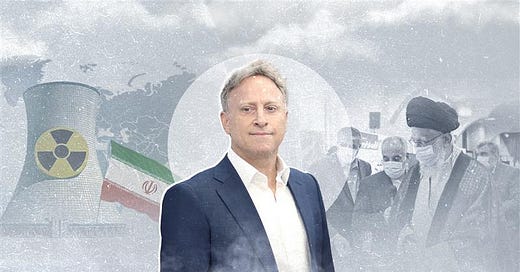"A Fight for Survival" - Former Netanyahu Chief of Staff on Israel’s War With Iran
As Israeli jets strike deep into Iran and a long-simmering shadow war erupts into open conflict, a former top aide to Prime Minister Benjamin Netanyahu calls it a fight Israel could no longer avoid.
“Israeli intelligence identified significant movement — a race for the bomb by Iran — which put Israel in a position where it was no longer feasible to sit back and wait,” said Ari Harow, Netanyahu’s former chief of staff, in an interview.
Israel’s objectives, Harow said, are clear: dismantle Iran’s nuclear program and eliminate its ballistic missile arsenal.
“Nothing beyond that has to be on the table,” he said.
He described the timing as deliberate, following years of Israeli warnings and growing urgency.
“Israel waited until the last moment before taking the necessary military steps.”
Iran has responded with waves of missile and drone attacks, some of which have killed civilians in Israel. Harow dismissed comparisons between the two sides.
“Israel has been very pinpoint — military sites, weapons sites, nuclear production sites,” he said. “The Iranians are targeting civilian populations.”
That, he added, prompted Israel to widen its target set.
“As long as both sides stay within parameters… the other side will respond in like.”
The current escalation, Harow argued, flows directly from the Hamas-led October 7 attacks.
“Keeping the proxies at bay was no longer an option,” he said, referring to groups like Hamas and Hezbollah. “The terrorists began their massacre… setting off a domino effect.”
Since then, Israel has hit targets in Gaza, Lebanon, Syria and Yemen — many tied to Iran’s regional network. Harow said the goal is to neutralize those threats to allow focus on Iran itself.
“Once Iran and its nuclear program are removed, I believe you'll see… a move toward closing various fronts.”
He drew comparisons to Israel’s past preemptive strikes on nuclear sites in Iraq (1981) and Syria (2007), but said this is different in scale and scope.
“Those were actions against single facilities. Here we’re dealing with a program that’s been developing for decades.”
Harow said a successful outcome could trigger regional realignments.
“Once the Iranian nuclear threat is removed, we will see significant movement toward peace and prosperity with Gulf countries and even potentially with Israel’s neighbors to the north.”
He said cooperation between Israel and Arab states on the Iran threat has long existed — even if quietly.
“Everybody in the region will be happier when that threat is removed, because the threat was not just for Israel.”
Asked whether regime change in Iran was a goal, Harow said it was not — but acknowledged rising discontent inside the country.
“The vast majority of Iranian citizens oppose this regime… exposed militarily… it definitely will breed hope for change.”
A Complicated Relationship With Netanyahu
Harow’s voice carries particular weight. He served as Netanyahu’s chief of staff from 2014 to 2015 and earlier as bureau chief in 2008, placing him inside the room during key national security decisions.
In 2017, Harow became a state’s witness in Netanyahu’s corruption trials. He was later convicted of breach of trust and sentenced in January 2024 to six months of community service as part of a plea deal.
Despite that history, Harow praised Netanyahu’s handling of the current crisis.
“From October 8 and on, this government has restored our security on the Northern front, on the Southern front, and now in dealing with Iran.”
He noted that the conflict has unified the country’s political factions — at least for now.
“There is unity around this war with Iran. Time will tell whether Netanyahu wins another term or whether the people are ready for something different.”
Asked to define Israel’s broader message, Harow was blunt:
“Israel will not stand by while somebody plans its destruction.”





